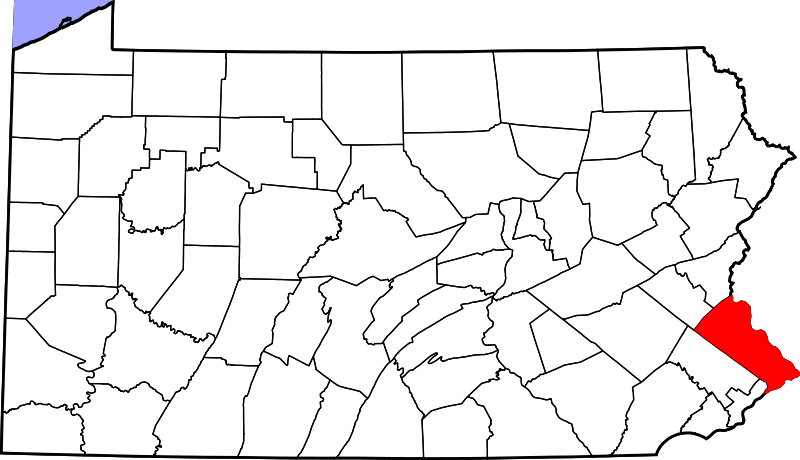
QUAKERTOWN, Penn.—Driving on John Fries Highway through Quakertown is almost like taking a guided tour of the local electorate.
First you pass a few farms—the last remnants of a fading way of life. Then there's a sign for Bethlehem Catholic School. Next up is LifeQuest Nursing Center on the left. Soon, you've sped past a smattering of small businesses—large appliances, lawn furniture, heating oil—and a billboard touting the "Light Sippin'" vehicles for sale at a nearby Ford dealership. By the time you finally arrive at 601 Mill St., site of Quakertown Memorial Stadium and, not coincidentally, the afternoon's John McCain and Sarah Palin rally, you've got a pretty decent idea which voters the GOP ticket is targeting in Bucks County: ex-urbanites, white ethnics, senior citizens, small-business owners and blue-collar workers.
The only problem? No one—including McCain and Palin—is actually in the stadium.
Shortly before Barack Obama struggled on stage this morning amid a chilly, steady rain, the McCain campaign announced it was postponing its 1:15 p.m. Quakertown event "due to weather." I decided to drive the 80 miles from Chester anyway—you know, to survey the lay of the land. If McCain wants to win on Election Day, he'd be well-advised to return as soon as possible.
In fact, this is the one keystone-state stop McCain can't afford to miss.
Bucks County is like Pennsylvania in miniature. It's technically a northern suburb of Philadelphia, completing the "collar" of counties that begins with Chester to the southeast and extends up through Delaware and Montgomery. But "suburban" doesn't really describe its notably diverse—and strikingly representative—population. The Wall Street Journal's Matthew Kaminski recently mapped the county's political topography well: "Rural northern 'upper Bucks' is socially conservative, clinging—as Mr. Obama famously said this year—to guns and religion; the center around Doylestown is fiscally conservative and socially liberal, once dominated by Republican 'moderates'; and "lower' Bucks around Bristol is blue-collar, formerly industrial, depressed and tends to vote Democratic."
As a result of this heterogeneity, Bucks has become something of a bellwether county in recent years. In 2000, Al Gore beat George W. Bush 50 percent to 46 percent in both Bucks County and greater Pennsylvania; four years later, Kerry's 51-48 margin in Bucks was almost identical to his statewide split (51-49). So it doesn't bode well for McCain that he's losing 43-46 in a new countywide poll by Politico/Insider Advantage.
Why, then, should the Arizona senator hurry back? Because if McCain wants to win the keystone state, Bucks is both his best place to start—and his best hope. As Michael Barone of U.S. News and World Report recently noted, Obama's entire 11-point lead in Pennsylvania comes from the population-heavy southeastern part of the state. The latest stats from SurveyUSA, for example, show the Democrat ahead 64 percent to 32 percent in the region. Right now, McCain's carrying the rural, pro-Republican west-central and south-central counties and polling within the margin of error in the traditionally Democratic areas around Pittsburgh and Scranton. If he weren't running so far behind Obama in metropolitan Philadelphia, he'd probably be within striking distance statewide. And he won't win unless he starts doing better.
That's where Bucks County comes in. Heavily urban Philly won't budge—nor will the posh Main Line suburbs of Delaware County or the ascendant exurbs of Chester County, which both voted for Obama in April's Democratic primary by double-digit margins. Once a Republican stronghold, Montgomery County, where Clinton won 51-49, may lean a little further to the right. But it's Bucks County that holds the most promise for McCain. There, Clinton clobbered Obama 63-37—a striking result considering that Chester County, a mirror image of Bucks County in 2004, chose Obama 55-45. What that suggests is that there's a different kind of Democrat in and around Quakertown—the kind that's notably less enamored of Obama than the rest of his metro Philly peers. Given that Bucks belongs to the Philly media market and ranks as the fourth most populous county in the state, it makes perfect sense for McCain to center his efforts here (in addition to driving GOP turnout in the west and center of the state). Target those Clinton Democrats in person. Get on Philly television as a result. Hope your message spreads across the rest of the "collar"—and boosts your broader metro margins on Election Day.
This isn't news to McCain. It's why he appeared in the suburbs twice the week before last and kicked off a cross-state bus tour in nearby Bensalem last Tuesday—a day after his wife Cindy campaigned in Bucks County. And it's why he was planning to return today. For now, McCain's intense focus on the region seems to be paying off: today's Bucks County Politico/Insider Advantage poll (which shows McCain losing by three) is an improvement over its Oct. 14 predecessor (which showed him losing by six). What's more, Obama has yet to approach the 50-percent threshold—meaning that undecideds could still swing the county for McCain. Ultimately, it's unlikely that a boost in Bucks County alone would erase Obama's double-digit lead in Pennsylvania. But as Bucks goes, so goes the state—or at least it has in past.
Which is why McCain would be wise to steer the Straight Talk Express down John Fries Highway. Pronto.
Uncommon Knowledge
Newsweek is committed to challenging conventional wisdom and finding connections in the search for common ground.
Newsweek is committed to challenging conventional wisdom and finding connections in the search for common ground.





